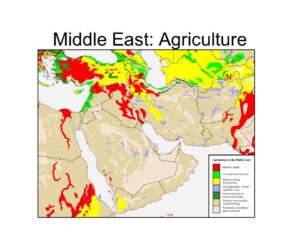When to Zoom In and When to Zoom Out: Which Types of Resources are Most Illuminating?
The conundrum of comparative politics is that we are constantly trying to say something general that can fit across numerous specific cases. We know that each region, country, city, and individual will be unique in some capacity. We also know that patterns can be discovered at each of these levels, and these patterns can produce new insights and observations. Yet, we risk making those observations too general if their scope is inaccurately wide. Validity and generalizability are on a sliding scale. We are always trying to apply the most accurate information to the largest sample size possible without compromising that accuracy. Correspondingly, the measures we use to study geographic and cultural regions should serve us in aiming for this sweet spot.
In studying MENA, history is useful in that it helps us understand both relations abroad and the persistence of authoritarianism. The legacy of European colonialism has bread distrust with foreign Western powers. Whether those Western powers truly have the best interest of these countries at heart is debated, but it is clear that their influence will almost always be met with skepticism. Furthermore, because hardly any of these countries have experimented with regular, functioning democracy, the cycle of authoritarian regimes makes more sense. Part of the difficulty of establishing democracy is building up robust institutions and the trust of the people in the system. When generations are used to a certain form of government, it is logical that they would struggle in moving past it.
The political economy classifications of the Cammet et al scholarship are suitable for understanding how a regime is able to operate. Whether a country is resource rich tells us approximately how much independent funds a regime has since oil is a major source of income for the region as a whole. In the event that a country is resource rich, depending on the size of its population, it can essentially buy the acquiescence of its people while heavily investing in the coercive apparatus. These regimes are also typically socially conservative and have the might to enforce their ideological beliefs. Resource poor countries must have more clever styles of maintaining power. Whether it is through false promises made to delay progress, the depoliticization and atomization of society, secret police, military control, beneficial ties to other state/s, or another strategy, resource poor regimes must make their capital go farther.
Single case studies are fruitful in that they reveal something greater about the region. In this instance, there is a higher risk of saying something that can only pertain to the one studied country. Its role can also be in identifying causal relationships in cases where it is not clear which factors lead to a certain outcome. As for Weeden’s examination of Syria, I found it helpful in having an extreme example to compare the rest of the region to in terms of demobilizing the public. It can be easy to think of all forms of authoritarianism as equally brutal, but Weeden demonstrates how Syria was horrific even by regional standards. Beyond that, it was quite narrow in its focus, which is, of course, the nature of case studies. Although it was beneficial to have this severe model as a contrasting tool, I did not recognize many ways in which Weeden’s study generated new ideas for the whole region.
